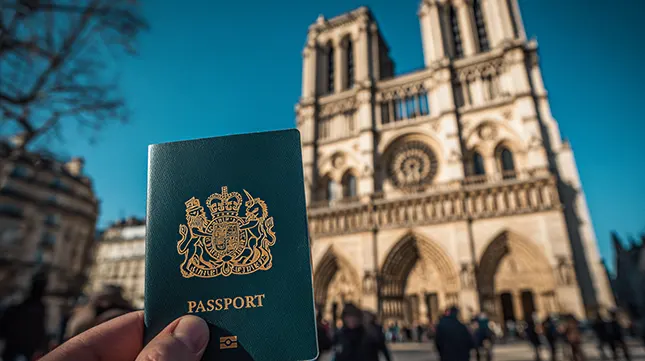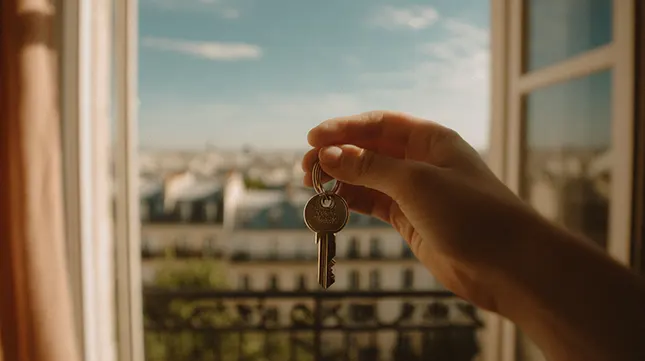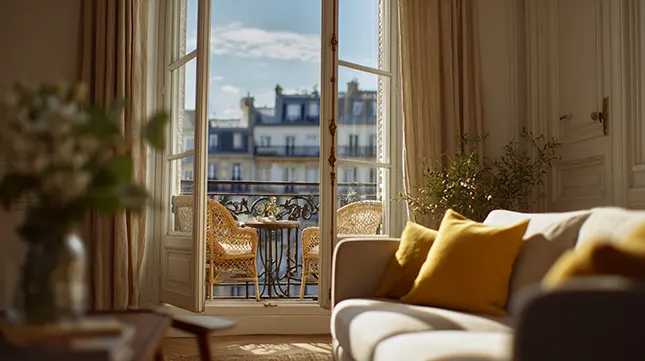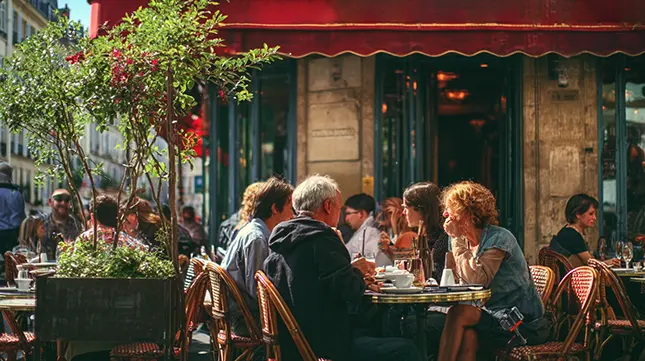Living in Paris – A Guide for Expats

Thinking about packing up and living in Paris?
The French capital has an irresistible pull, blending centuries-old charm with a fast-paced, modern lifestyle.
For newcomers, the city can feel like a maze of cobbled streets, grand boulevards, and cultural traditions that take time to decode.
Beyond the postcard views of the Eiffel Tower and café-lined pavements, Paris offers a complex yet rewarding experience—one where rich history meets thriving job markets, world-class cuisine, and an enviable public transportation network.
This guide breaks down what you really need to know: from visas and housing to healthcare, etiquette, and day-to-day living.
Whether you’re chasing a career move, romance, or simply a fresh adventure, Paris might just be the life-changing leap you’ve been waiting for.
Why Paris Still Pulls Expat Dreamers

Expats are drawn to Paris for its unique blend of vibrant culture, charm, and career opportunities.
Paris has always been more than just the City of Light; it’s a magnet for creativity, culture, and ambition.
Sure, it’s not always easy, bureaucracy bites, and yes, the cost of living is high, but that intoxicating mix of sidewalk cafés, historic architecture, and intellectual energy? Totally worth it.
Expats keep coming because Paris functions like a compact cultural wonder by day, a nightlife mecca by night, and a career accelerator if you’re in art, tech, media, or gastronomy.
If you’re looking for a place that fuels your soul and challenges your comfort zone, Paris is calling.
Visa, Permits & Residency: Getting Legal Without Losing Your Mind

A long-stay visa or Talent Passport is the essential first step for non-EU citizens moving to Paris.
Here’s the real deal: as a non‑EU citizen, you get 90 days visa‑free within Schengen, but that’s a tourist stay and nowhere near enough time to really immerse yourself in the Parisienne lifestyle.
For real life, you’ll need a long‑stay visa (like VLS‑TS) or a Talent Passport, student visa, or work permit.
The process can feel like running a bureaucratic gauntlet, especially with the numerous visas to choose from.
However, sites like France’s official visa portal will break it down for you.
The “Do I Need a Visa” calculator is a valuable tool that helps you select the appropriate visa for your specific situation and needs.
Getting Professional Help – Make it Easy for Yourself

Professional agents can simplify complex visa applications, saving you time and stress with French bureaucracy.
If you’re wrestling with French visa red tape or feeling like you’re decoding an ancient manuscript, it might be time to consider expert help.
Going down the DIY visa route can work well if you speak decent French, your case is straightforward (think student or short-stay visa), and you’re comfortable navigating and understanding official websites.
There is no doubt that you will save money and get a sense of ownership, but brace yourself, it’s time-consuming, stressful, and errors can cost you big.
On the other hand, using a professional visa agent, particularly when time is of the essence, makes life significantly easier.
They know the quirks of different local offices, help you dodge red flags, and can save you money and lots of headaches in the long run.
Check out the FabExpat website; they are experts in the French visa process. Why not let them (or another company), take the hard work out of the visa process.
Rent, Neighbourhoods & Where You’ll Hang Your Hat

Each of Paris’s 20 arrondissements offers a distinct lifestyle, from chic and upscale to vibrant and artistic.
Once you have your long-term visa in place, it’s time to search for the right location to call home.
Renting is the best way forward because you can take your time to really get to know Paris and its “20 arrondissements” or districts until you are sure of the perfect location.
It is helpful to know that the number of the arrondissement is indicated by the last two digits in most Parisian postal codes, 75001 up to 75020. They are arranged in the form of a clockwise spiral, often likened to a snail shell, starting from the middle of the city, with the first on the Right Bank (north bank) of the Seine.
Paris neighbourhoods are as diverse as its restaurants and wine lists.
Wanna live the bougie life? The 7th, western arrondissements are chic. Want vibrant, artsy energy? Le Marais (4th) or Montmartre (18th) are packed with character, and yes, that includes a buzzing LGBTQ+ scene.
Prices can start at €1,200 for a cosy one‑bedroom, and skyrocket in value depending on location.
Inner suburbs like Montreuil and St-Ouen offer more affordable rent, around €23–25 per m², while still being a quick Metro or bike ride from central Paris.
The only real way to get a feel for the rental market and what is available is by spending time looking through the online real estate websites such as SeLoger and PAP.
Overview of the Real Estate Market in Paris 2025?

The 2025 Paris property market is stabilising, creating an optimistic environment for expat buyers.
Before you go ahead and jump in, it is a good idea to familiarise yourself with how the real estate markets are performing in Paris.
After a bumpy couple of years, the Parisian property market is finally finding its footing.
The average price per square meter in the capital hovers between €9,420 and €9,880, which is close to reversing the recent 3–5% drop.
Buyers are back: transaction volumes are up, with Greater Paris expecting 5–10% more deals this year and a mild 2–3% lift in prices.
Micro‑markets tell different stories, though, with hotspots like Saint‑Germain‑des‑Prés holding strong, while outer arrondissements offer more value.
Low mortgage rates are helping too. In short? It’s cautiously optimistic territory, and a good time for UK expats considering buying a home to start the process.
Paris Property Buying Made Simple for UK Expats

Key steps for UK expats buying property in Paris, from budgeting with a notaire to finalising the sale.
As it is very much a buyer’s market, you will find stabilised prices and more room to negotiate a better deal.
Purchasing in France works differently from the UK, so expect a learning curve.
The good news? With solid research, a realistic budget, and help from experienced professionals, British expats can navigate the process confidently.
These are some of the top tips to consider:
- Research & Budgeting – Explore pricing trends through Notaires de France and sites like Seloger . Set a realistic budget early, factoring in 7–8% notaire fees, taxes, and registration costs.
- Finding Your Property – Paris prices vary hugely. In prestigious districts like the 1st or 7th, luxury homes can hit £29,700/m². In contrast, the 20th arrondissement offers Belleville or Père-Lachaise apartments at around £11,280/m². One-bedroom studios can be found from £100,000 but expect most to be nearer £300,000.
- Engaging a Notaire – A notaire is essential for contracts, title checks, and the transfer of ownership.
- Making an Offer & Due Diligence – Offers are usually made through your agent. If accepted, you’ll sign a binding compromis de vente. Your notaire then verifies the title and checks for debts or legal issues.
- Finalising the Sale – The acte de vente is signed in the notaire’s presence, and the balance is paid before you get the keys.
Financing Note: Post-Brexit, UK buyers can still purchase homes. French residents may access up to 100% mortgages, EU nationals (including Brits) up to 85% LTV, and non-EU citizens up to 60%.
For detailed arrondissement-by-arrondissement pricing, see Realtin’s Paris report; it’s an ideal guide to assist you with your property search location.
Transport & Getting Around Without Four Wheels

Thanks to its excellent Métro and expanding bike lanes, getting around Paris without a car is easy.
The sweetest thing about Paris? Is that you rarely need a car to get around?
The public transit system, RATP’s buses, Métro, RER, and cycling lanes are next level.
Currently, big infrastructure moves are widening bike lanes and chopping down car spaces.
For example, over 1,000 km of new bicycle paths were added under the city’s Plan Vélo programs, reassigning road space without increasing congestion.
Additionally, Parisians voted to pedestrianise 500 more streets, expanding green zones and reducing parking spaces. Your Sunday strolls just got XXL upgrades!
And yes, the 15-minute city idea is still thriving; shops, workplaces, schools, and cafés are increasingly within easy walking or cycling distance, making daily life smoother, greener, and more enjoyable.
Car-free isn’t niche, it’s the norm in Paris. Fewer cars, more walking, cycling, greener spaces, and smart planning.
Ready to be one of those smug people who stroll, pedal, or ride the Métro everywhere? Because that’s life here, and it’s fantastic.
If you are determined to drive in Paris, beware, it is not for the faint of heart. With narrow streets, heavy traffic, limited parking, and strict low-emission rules, most locals avoid it altogether.
The city operates a Crit’Air sticker system restricting older, more polluting vehicles, and several central areas are now pedestrian-only.
Parking is scarce and expensive, with strict enforcement. Unless you need a car for trips outside the city, you’re far better off using Paris’s excellent public transport, cycling network, or simply walking.
Finance & Taxes: Your Wallet Needs a Figure-Eight Grip
Taxes in France are… nuanced, to say the least.
Spend more than 183 days here, or call France your main hub, and you are a tax resident and pay tax on your worldwide income.
Income tax works at the household level: two adults plus one child? Your taxable income gets divided by 2.5 “parts,” effectively lowering your tax bracket Experts for Expats.
Mandatory filings are annual, deadlines in May/June, and yes, there’s a TV license fee ( around €133) and local council tax (taxe d’habitation) due in October Experts for Expats.
The warning here is, don’t wing it! Talk to an expat‑friendly tax pro as soon as possible. You can find one via the freelancer website.
Alternatively, visit the ESCEC website for all the information you need as a UK expat paying tax in France.
Healthcare: Staying Healthy Without Losing Your Mind

After three months, expats can access France’s public healthcare, best supplemented with a private mutuelle.
France offers a world-class, hybrid healthcare system combining state-funded public insurance (Assurance Maladie/PUMA) and optional private “top-up” (mutuelle) plans.
After about three months of legal residency, expats become eligible for public coverage, receiving reimbursement of around 70% of standard medical costs, and up to 100% for chronic or serious conditions.
Doctors generally set fees centrally but may charge extra, especially in cities like Paris.
That’s where a mutuelle comes in; most residents have one to cover remaining costs and extras like specialist fees or private rooms.
Payroll taxes, employer contributions, and state budgets primarily fund the system.
In short, the French enjoy high-quality, affordable, and broadly accessible healthcare, which is further enhanced by a mutuelle for added peace of mind.
For UK expat new arrivals, private or international health insurance is a must.
Cost? It can be around $45/month for basic coverage, but that depends on age and policy specifics.
For an in-depth look at how to understand, use and register for the French healthcare system, Fab.french insurance has a comprehensive guide.
For non-EU citizens who intend to live in France for the foreseeable future, getting to grips with the French healthcare system will quite literally be a lifesaver.
The Paris Job Market 2025 – Skills Employers Are Chasing

The Paris job market is strong in tech and sustainability, valuing practical skills and French language ability.
Once you have your work permit (an absolute must), you can legally work anywhere in France.
Paris is hungry for talent, especially in tech, AI, cybersecurity, finance, and digital marketing, with expertise in Python, SQL, JavaScript, AWS, and machine learning leading the charge.
Employers now favour skill-based hiring over formal degrees, particularly in AI and sustainability roles, so bolster your CV with online courses, bootcamps, or vocational training.
But don’t underestimate soft skills: analytical thinking, adaptability, leadership, and communication remain crucial.
Utilising job search websites like LinkedIn, Justlanded, and Glassdoor can also provide access to numerous opportunities across various more traditional sectors such as retail, hospitality, fashion and finance.
To land that job, build your network early. Attend job fairs, join expat groups, and get mentorship via platforms like InterNations or AFIJ.
Tailor your CV and cover letter to French expectations, learn some Français (especially formal “vous”), and be ready to showcase how your international experience gives you an edge.
Boost your prospects by taking local French classes and getting involved in internships or volunteer work; both are great ways to build experience, grow your network, and show employers you’re serious about building a career in Paris.
If you are a digital nomad and your laptop is your lifeline, Paris caters for you, but there are a few caveats.
High cost of living and tenants needing proof of stable income (like a CDI) are real hurdles.
However, co‑working spaces – WeWork or Morning, and even some cafés (with permission), plus public libraries, make working remotely workable.
Thriving at Work in Paris: Customs Every Expat Should Know
Working in Paris comes with its own rhythm.
Professionalism and respect are essential, punctuality matters, greetings are formal (“bonjour” or a handshake), and office attire is almost always smart.
The workday is focused and efficient, but the French fiercely protect work–life balance.
Expect generous lunch breaks, often up to two hours, perfect for connecting with colleagues over good food.
Employees enjoy at least five weeks’ paid holiday, and the 35-hour workweek is law, with overtime strictly regulated. This structure fosters both productivity and well-being, making job satisfaction high.
While expectations are professional and performance-driven, there’s a strong cultural emphasis on personal time, leisure, and quality of life.
For expats, embracing these customs can make the transition smoother and help you thrive in a uniquely French work environment.
Paris on a Budget: Smart Ways to Live Well for Less

Live affordably in Paris by shopping at local markets, enjoying free museums, and living in outer districts.
Like all major cities, living in Paris can be expensive, although it has a reputation for being pricey; with some savvy choices, you can live comfortably without overspending.
Housing is your most significant cost; look to the outer arrondissements or nearby suburbs for better value and lower rents.
Shop at local markets like Marché d’Aligre or Marché Bastille for fresh bread, cheese, and seasonal produce at lower prices than supermarkets.
When dining out, choose the plat du jour at small cafés or check La Fourchette for restaurant deals.
Entertainment doesn’t have to cost a fortune either. Enjoy free activities like strolling along the Seine, relaxing in Jardin du Luxembourg, or exploring Paris’s free museums and galleries. Check Paris.fr for current free events.
With a bit of planning, the City of Light can be surprisingly affordable.
Social Vibes & Fitting In: Don’t Be a Fish Out of Water

To fit in, embrace local etiquette like la bise, make an effort to speak French, and be social.
Paris comes with its own rulebook, etiquette matters, and it pays to understand them.
La bise (two cheek kisses) is normal, even among acquaintances; a handshake at work seems stiff by comparison.
Parisians cherish elegance, reserve, and wit over small talk.
Money talk? That’s a huge no-no and off limits for most Parisians.
Don’t turn down any offers to socialise, if you are asked out for drinks after work, or over the weekend, make the effort. Of course, you will feel out of your comfort zone to begin with, that’s natural.
To truly break out of the expat bubble, you must learn French. Just go to local shops, markets and cafes, keep trying and eventually you’ll start blending in, not sticking out.
From Icons to Hidden Gems: Paris’s Top Sights
Discover must-see attractions, from the iconic Eiffel Tower and Louvre to the stunning views from Sacré-Cœur.
When the weekend arrives, you’ll want to explore the city further.
Paris is packed with world-class attractions that make it one of the most visited cities in the world.
From historic landmarks to art-filled museums and breathtaking viewpoints, there’s something here for every taste.
Whether you’re exploring for a weekend or settling in long-term, these must-sees are perfect for soaking up the city’s culture and charm.
Top 6 Attractions in Paris
- Eiffel Tower – The ultimate Paris icon, offering panoramic city views from its viewing platforms.
- Louvre Museum – Home to the Mona Lisa and thousands of masterpieces from across the globe.
- Notre-Dame Cathedral – A Gothic masterpiece (currently under restoration) with stunning architecture and history.
- Sacré-Cœur Basilica – Perched atop Montmartre, it delivers one of the best views in Paris.
- Musée d’Orsay – Showcasing Impressionist and Post-Impressionist art in a grand former railway station.
- Seine River Cruises – A relaxing way to see Paris’s landmarks from a unique waterside perspective.
Beyond the City: Day Trips and Weekend Escapes from Paris

Paris is the perfect base for weekend escapes to the Loire Valley, Champagne, and even London.
One of the true joys of living in Paris is how quickly you can swap city streets for stunning scenery.
Within just a couple of hours, you could be sipping champagne in the vineyards of Reims or wandering the fairy-tale châteaux of the Loire Valley.
Hop on the RER to uncover charming villages and peaceful countryside right on the city’s doorstep.
For more adventurous escapes, the French Alps promise world-class skiing in winter and spectacular hiking in summer.
Prefer a change of country? The Eurostar can whisk you back to London in just over two hours, making weekend trips home effortless.
With numerous remarkable destinations within easy reach, Paris offers the perfect balance between vibrant urban life and numerous opportunities for unforgettable getaways.
Your Trusted Mover for a Smooth Paris Relocation

Yes, relocating to Paris is a big step, but with the proper support, it can be a smooth, stress-free experience.
Choosing a trusted removal company is key, especially one with proven expertise in European moves.
White & Company Removals & Storage has been helping people start new chapters abroad for decades, offering dependable, competitively priced services tailored to your needs.
As proud members of the British Association of Removers (BAR), OMNI, and FIDI, we follow the highest industry standards, giving you complete peace of mind.
Getting started is easy; you can arrange a free, no-obligation home or virtual survey for an accurate quote or use their quick online form for instant estimates.
One of our friendly team (and handy chatbot) is always ready to guide you through the process.
With White & Company handling the logistics, you can focus on the exciting part, settling into your new Parisian life.

Max is a seasoned writer and blogger in the real estate and home moving sectors, as well as a knowledgeable source of information for expatriates living and working abroad. His detailed insights have helped thousands of people move and live abroad with greater simplicity and ease.
Posted in: News
Leave a Comment (0) ↓


